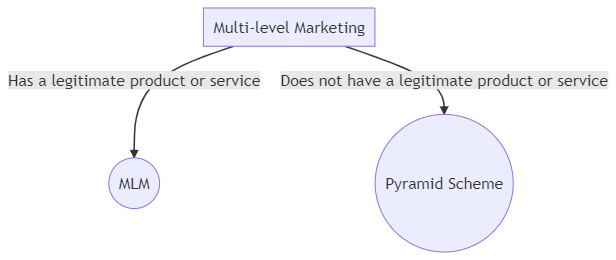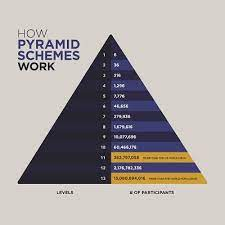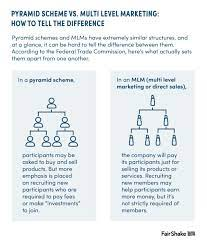
We have created this comprehensive guide to help consumers protect themselves from investment scams. We understand the importance of being well-informed about these common scams and how they can affect your financial security. As a result, we’ve compiled a list of the most common investment scams and tips on how to avoid them.
Types of Investment Scams
Ponzi Scheme
One of the most common types of investment scams is the Ponzi scheme. It involves a promoter of investment firms who promises high returns to lure investors in, but in reality, the champion has lost money. It is just using the money from new investors to pay off the earlier investors. Ponzi schemes inevitably collapse when the promoter can no longer attract new investors to fund the promised returns.
Pyramid Schemes
Another type of investment scam is the pyramid scheme. It is similar to the Ponzi scheme in that it recruits new investors to give money to generate returns for the earlier investors. Pyramid schemes typically involve a hierarchical pay structure, with those at the top receiving the largest returns.
Pump and Dump Schemes
Pump and dump schemes involve fraudulent activity by promoting a falsely inflated stock, followed by the stock sale at a profit. The promoters often use false or misleading information to attract investors and inflate the stock price.
High-Yield Investment Programs (HYIPs)
HYIPs are investment scams, investments, and securities that promise high returns with little risk. They often target inexperienced investors looking for a quick and easy way to make money. These programs, investments, and securities are not legitimate investments and often result in significant financial losses.
Tips to Avoid Investment Scams
Do Your Research
Before investing in anything, make sure to do your research. Research the company, the investment opportunity, and the people involved. Check their credentials and make sure they have a solid reputation.
Don’t Be Fooled by Guarantees
Be wary of any investment opportunity that guarantees high returns with little risk. Legitimate investments always involve some degree of risk.
Be Cautious of High-Pressure Sales Tactics
Scammers often use high-pressure sales tactics to get you to invest money quickly. Don’t be rushed into making a decision. Take your time and make an informed decision.
Watch Out for Unsolicited Investment Opportunities
Be cautious of investment opportunities for money paid by other investors that come to you unsolicited. For example, most investors typically do not advertise legitimate investment opportunities for securities and mutual funds in this way.
Seek Professional Advice If you’re unsure about an investment opportunity, seek professional advice. Talk to a financial advisor or investment professional before investing your money.
In conclusion, it is essential to protect yourself and lose money from investment fraud and scams by being aware of the different types of scams and knowing how to avoid them. Following the tips and written information outlined in this guide, you can protect yourself and your finances from investment fraud and mlm what you need to know about scams. Remember, if an investment opportunity seems too good to be true, it probably is.

Don’t Fall for Emotional Appeals Investment scammers often try to appeal to your emotions by promising you a better future or financial security. Don’t let your emotions cloud your judgment. Always be skeptical and do your research.
Be Wary of Unregistered Investments Not registered with the appropriate government agencies or regulatory bodies are often scams. So, check if the investment is a genuine product registered with the proper regulatory body before investing.
Check the Promoter’s Background Before investing with a promoter, check their background. Look for any red flags or negative reviews. You can also check if the champion has any other financial industry regulatory authority or legal issues.
Beware of Investment Seminars Investment seminars can be a breeding ground for investment scams. Scammers often use these seminars to pitch their fraudulent investment opportunities to unsuspecting attendees.
Keep Your Information Safe Investment scammers may try to obtain your personal information, such as your social security number or bank account information. Be cautious about who you give your personal information, and always keep it safe.
Following these tips, you can protect yourself from easy money from investment scams and make informed investment decisions. Remember, if an investment opportunity seems too good to be true, it probably is. So don’t let investment scammers take advantage of you and your hard-earned money.

Pyramid schemes are fraudulent investment scams that promise high returns to participants, typically through recruiting others to join the scheme. Unfortunately, these schemes are illegal and unsustainable, with only a select few at the top of the pyramid profiting at the expense of most participants who lose their money.
In this article, we will explore the ins and outs of pyramid schemes, including the different types, how to identify them, and what to do if you suspect you have been targeted by one. We will also discuss the legality of pyramid schemes and the potential consequences of participating in one.
Types of Pyramid Schemes
There are several types of pyramid schemes, each with its unique characteristics. The most common styles include:
Classic Pyramid Schemes: This type of pyramid scheme requires participants to recruit others to join the project, with a promise of high returns on their investment. As more people join with promises of high returns, the pyramid grows, and those at the top reap the benefits. However, once recruitment slows down, the scheme collapses, and those at the bottom lose their money.
Multi-Level Marketing (MLM) Schemes: MLMs are similar to classic pyramid schemes but are often disguised as legitimate business opportunities. Participants are encouraged to buy securities and exchange commissions to sell products, promising to earn commissions on sales made by themselves, other investors, and their recruits. However, most earnings come from recruitment rather than securities and exchange commission rather than sales, making it a pyramid scheme in disguise.
Ponzi Schemes: Ponzi schemes are investment fraud in which returns are paid to earlier investors using funds from newer, later investors only. The scheme continues to pay out money until it becomes unsustainable, and the operator disappears with the investor education remaining funds.

Identifying Pyramid Schemes
Pyramid schemes can be challenging to identify, as they often use tactics to make them appear legitimate. However, there are several red flags to look out for, including:
High Investment Returns: Pyramid schemes promise high returns on investment, or passive income, often with little to no risk. It probably is if a person-to-person retail sales call, product sales, or investment opportunity sounds too good.
Recruitment-Based: Pyramid schemes rely heavily on recruitment, rewarding participants for bringing in new members. Therefore, if recruiting unwitting investors is the main focus of an investment opportunity, it is likely a pyramid scheme.
Lack of Product or Service: Pyramid schemes often lack a legitimate product or service, with participants only making money through recruitment of the state and federal bureau, securities regulators, and exchange commission. If an investment network marketing opportunity does not have a clear product or service being sold, it is likely a pyramid scheme.
The Legality of Pyramid Schemes
Pyramid schemes and securities fraud are illegal in many countries, including the United States. However, participating in a pyramid scheme or reporting fraud can result in severe consequences, including fines, imprisonment, and a damaged reputation for financial fraud.
Cut Your Losses: If you have already invested enough money in a pyramid scheme, cut your losses and stop supporting any other investment fraud file now. Contact your bank or credit card company to report fraud, try to get lost money, and reverse any transactions if possible. However, keep in mind that it can be difficult to recover any lost funds.
Educate Yourself: Educating yourself on how pyramid schemes report financial fraud can work and how to identify them can help prevent you from falling victim to them. Also, keep up with the latest scams and frauds and learn to protect yourself.

In conclusion, pyramid and investment fraud schemes are fraudulent investment scams that promise high returns to participants through recruitment. They are illegal and unsustainable, with only a select few profiting at the expense of the majority, who lose their money. To protect yourself from the pyramid and investment fraud schemes, educate yourself on identifying them, reporting them to the relevant authorities, and research before investing in any opportunity. Remember, if an investment opportunity sounds too good to be true.
CoopBusiness is a revolutionary cooperative business-building platform that empowers individuals to become entrepreneurs, business owners, and financially independent.
As a member, you’ll receive top-level business mentorship, access to our proprietary business systems, and the opportunity to access the funds you want to turn your business ideas into reality.